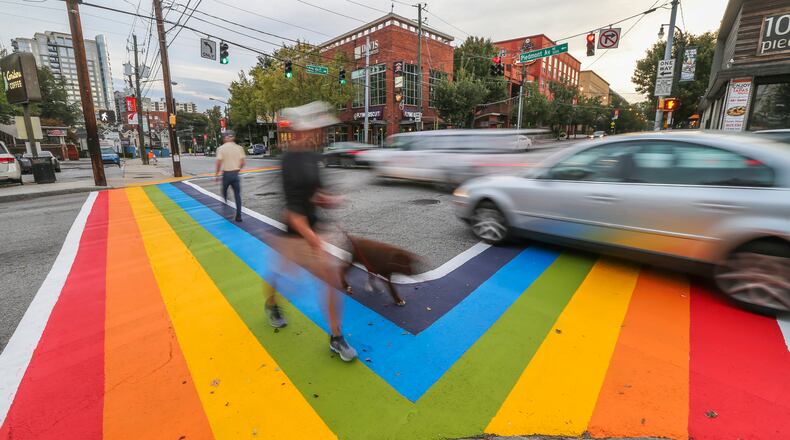In a tight space on the corner of West Peachtree and 12th Street, roughly 75 residents and city officials gathered Thursday evening to celebrate the release of Atlanta's first biennial report on the LGBTQ community.
The booklet details the city’s accomplishments since creating its first LGBTQ Affairs program in 2018 along with a 35-member LGBTQ advisory board that suggests policy to Atlanta Mayor Keisha Lance Bottoms. The report’s release also comes as the city prepares for the Atlanta Pride Festival’s 50th anniversary in October.
“We felt that it was important to tell the story of Atlanta’s inclusiveness and the mayor’s commitment to the LGBTQ community,” said Malik Brown, coordinator for LGBTQ Affairs program. The city released the report, which chronicles key events and milestones from the past two years, at its launch party at Creative Approach, a design and printing company.
The milestones included donating more than $150,000 to 10 LGBTQ organizations and causes, and earning a perfect score on the Human Rights Campaign's Municipal Equality Index.
The city also held several LGBTQ-centered events in the past year, including Drag Queen Story Hour and its first Transgender Remembrance Day memorial event.
While the report largely focuses on the city’s accomplishments, it does not include specific statistics about the city’s LGBTQ residents and issues they face.
“It is hard to quantify the LGBTQ community from a numbers perspective,” Brown said, but it’s something the city may consider down the line.
“We’re definitely moving toward a data-driven approach, but in the first (report) we thought it was best we give the lay of the land and get some of our policy and programs out.”
At Thursday’s event, LGBTQ Advisory Board co-chair Pamela Stewart also announced Ryan Roemerman will be the newest co-chair, replacing Kirk Rich, who was appointed to Atlanta Housing’s board of commissioners.
Bottoms did not attend the event, but her chief of staff Carmen Chubb said, “There’s still more to come.” She did not reveal what the mayor’s plans were.
Brown said sometime this year the city will host an LGBTQ Opportunity Fair, a one-day event aimed at helping LGBTQ people find jobs and connecting them with resources.
“I think the top of our mind right now is definitely employment,” Brown said. “If you are gay or transgender, just being out at work is a little bit harder here in the South.”
Stockbridge resident Rena Ingram, who has lived in metro Atlanta since 2014, praised the report. She said she has noticed the changes the city has made to be more supportive of LGBTQ residents.
“From what I’ve observed, support is more out and in the open,” she said, noting the rainbow crosswalk at 10th Street and Piedmont Avenue. “There are different things that have made our community more known than I’ve seen over the span of time.”
Midtown resident David Little moved to the city with his partner Edric Figueroa, an Atlanta native, in June.
“I’ve always had a certain idea about what the South was,” said Little, who is from Seattle, “and I’ve been really impressed with Atlanta’s politics and just the diversity, so it’s cool to see.”
Figueroa said he’s pleased with the city’s efforts but hopes to see more work done.
“I think that’s really just the start,” he said. “We need to continue to put our dollars where our values are.”
Figueroa said he’d also like for the city to focus on efforts to aid LGBTQ residents harmed by rising rent and neighborhood property values.
"The city has a rapid rate of gentrification and business that are good for the economy, but we also have to think about the little man. There are queer poor people. I was a queer poor person before. I'm in a different tax bracket, but I'm not going to forget my roots."
About the Author
Keep Reading
The Latest
Featured



